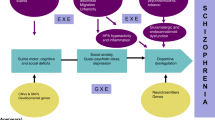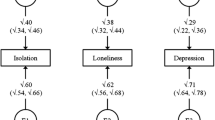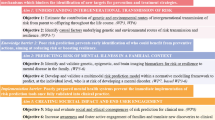Summary
Life-event research as well as neurobiological findings point to the relevance of adverse stress for the pathogenesis of affective disorders. The well established genetic root might be related to the sensitivity to stress. In concordance, recent studies showed a synergistic interaction between genetic loading and life-events concerning the precipitation of depression, i.e. there might exist a genetic sensitization to the adverse effects of stressors. The present investigation, using information extracted from 877 case records, did not reveal a synergistic interaction concerning the age at onset and the mean frequency and duration of episodes.
Similar content being viewed by others
References
Bebbington PE, Tennant C, Hurry J (1991) Adversity in groups with an increased risk of minor affective disorder. Br J Psychiatry 158: 33–40
Brown GW (1993) Life events and affective disorder: replications and limitations. Psychosom Med 55: 248–259
Craddock N, McGuffin P (1993) Approaches to the genetics of affective disorders. Ann Med 25: 317–322
Fritze J (1993) The adrenergic-cholinergic imbalance hypothesis of depression: a review and a perspective. Rev Neurosci 4: 63–93
Fritze J, Lanczik M, Sofic E, Struck M, Riederer P (1995) Cholinergic neurotransmission seems not to be involved in the category depression but possibly in personality. J Psychiatr Neurosci 20: 39–48
Golden RN, Potter WZ (1986) Neurochemical and neuroendocrine dysregulation in affective disorders. Psychiatr Clin North Am 9: 313–327
Harris T, Brown GW (1985) Interpreting data in aetiological studies of affective disorder: some pitfalls and ambiguities. Br J Psychiatry 147: 5–15
Isometsa E, Heikkinen M, Henriksson M, Aro H, Lonnqvist J (1995) Recent life events and completed suicide in bipolar affective disorder. A comparison with major depressive suicides. J Affect Disord 33: 99–106
Kendler KS, Kessler RC, Walters EE, MacLean C, Neale MC, Heath AC, Eaves LJ (1995) Stressful life events, genetic liability, and onset of an episode of major depression in women. Am J Psychiatry 152: 833–842
Leong SS, Brown WA (1987) Acetylcholine and affective disorder. J Neural Transm 70: 295–312
Maier W, Lichtermann D, Minges J, Hallmayer J, Heun R, Benkert O, Levinson DF (1993) Continuity and discontinuity of affective disorders and schizophrenia: results of a controlled family study. Arch Gen Psychiatry 50: 871–883
Mathew MRK, Chandrasekaran R, Sivakumar V (1994) A study of life events in mania. J Affect Disord 32: 157–161
McGuffin P, Thapar A (1992) The genetics of personality disorder. Br J Psychiatry 160: 12–23
Perry JC, Lavori PW, Pagano CJ, Hoke L, O'Connell ME (1992) Life events and recurrent depression in borderline and antisocial personality disorders. J Pers Disord 6: 394–407
Post RM (1992) Transduction of psychosocial stress into the neurobiology of recurrent affective disorder. Am J Psychiatry 149: 999–1010
Poulton RG, Andrews G (1992) Personality as a cause of adverse life events. Acta Psychiatr Scand 85: 35–38
Rich CL, Fowler RC, Fogarty LA, Young D (1988) San Diego suicide study. III. Relationships between diagnoses and stressors. Arch Gen Psychiatry 45: 589–592
Rodgers B (1991) Models of stress, vulnerability and affective disorder. J Affect Disord 21: 1–13
Stout SC, Nemeroff CB (1994) Stress and psychiatric disorders. Semin Neurosci 6: 271–280
Swann AC, Secunda SK, Stokes PE, Croughan J, Davis JM, Koslow SH, Maas JW (1990) Stress, depression, and mania: relationship between perceived role of stressful events and clinical and biochemical characteristics. Acta Psychiatr Scand 81: 389–397
Taylor MA (1992) Are schizophrenia and affective disorder related? A selective literature review. Am J Psychiatry 149: 22–32
Tennant C (1994) Life stress and psychiatric illness. Curr Opin Psychiatry 7: 207–212
Zahn TP, Nurnberger JI, Berrettini WH (1989) Iectrodermal activity in young adults at genetic risk for affective disorder. Arch Gen Psychiatry 46: 1120–1124
Zahn TP, Nurnberger JI Jr, Berrettini WH, Robinson TN Jr (1991) Concordance between anxiety and autonomic nervous system activity in subjects at genetic risk for affective disorder. Psychiatry Res 36: 99–110
Author information
Authors and Affiliations
Rights and permissions
About this article
Cite this article
Fritze, J., Schneider, B. & Maurer, K. Additive effects, but no synergistic interaction of stressful life-events and genetic loading in affective disorders. J. Neural Transmission 103, 1221–1229 (1996). https://doi.org/10.1007/BF01271207
Received:
Accepted:
Issue Date:
DOI: https://doi.org/10.1007/BF01271207




